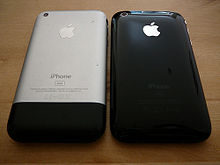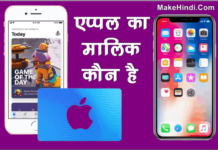| NETWORK | Technology | GSM / HSPA |
|---|
| LAUNCH | Announced | 2008, June. Released 2008, July |
|---|---|---|
| Status | Discontinued |
| BODY | Dimensions | 115.5 x 62.1 x 12.3 mm (4.55 x 2.44 x 0.48 in) |
|---|---|---|
| Weight | 133 g (4.69 oz) | |
| SIM | Mini-SIM |
| DISPLAY | Type | TFT capacitive touchscreen, 16M colors |
|---|---|---|
| Size | 3.5 inches, 36.5 cm2 (~50.9% screen-to-body ratio) | |
| Resolution | 320 x 480 pixels, 3:2 ratio (~165 ppi density) | |
| Protection | Corning Gorilla Glass, oleophobic coating |
| PLATFORM | OS | iOS, upgradable to iOS 4.2.1 |
|---|---|---|
| CPU | 412 MHz ARM 11 | |
| GPU | PowerVR MBX |
| MEMORY | Card slot | No |
|---|---|---|
| Internal | 8/16 GB, 128 MB RAM |
| MAIN CAMERA | Single | 2 MP |
|---|---|---|
| Video | No |
| SELFIE CAMERA | No |
|---|
| SOUND | Loudspeaker | Yes |
|---|---|---|
| Alert types | Vibration, proprietary ringtones | |
| 3.5mm jack | Yes |
| COMMS | WLAN | Wi-Fi 802.11b/g |
|---|---|---|
| Bluetooth | 2.0, A2DP (headset support only) | |
| GPS | Yes, with A-GPS | |
| Radio | No | |
| USB | 2.0 |
| FEATURES | Sensors | Accelerometer, proximity |
|---|---|---|
| Browser | HTML (Safari) | |
| – Audio/video player – TV-out – Organizer – Document viewer – Photo viewer – Predictive text input |
| BATTERY | Non-removable Li-Ion battery | |
|---|---|---|
| Stand-by | Up to 300 h | |
| Talk time | Up to 10 h | |
| Music play | Up to 24 h |
| MISC | Colors | Black(8/16 GB), White (16 GB) |
|---|---|---|
| SAR | 0.52 W/kg (head) 1.29 W/kg (body) | |
| SAR EU | 0.56 W/kg (head) 0.23 W/kg (body) | |
| Price | About 90 EUR |
| TESTS | Loudspeaker | Voice 66dB / Noise 62dB / Ring 71dB |
|---|---|---|
| Audio quality | Noise -89.9dB / Crosstalk -93.1dB |
On July 11, 2008, Apple released the iPhone 3G across twenty-two countries in two storage options, 8GB and 16GB. The 16GB model was produced in either black or white.[11][12]
Following the release of the successor iPhone 3GS model one year later, the iPhone 3G remained on sale but became Apple’s budget phone offer, with its price cut in half. This $99 iPhone 3G required a two-year contract and was available only in black and with 8 GB of storage, but came bundled with the then-new iPhone OS 3.0 firmware.[13] On June 7, 2010, the iPhone 3G was finally discontinued, and replaced as Apple’s budget phone by an 8GB iPhone 3GS selling for the same price of $99 with a 2-year contract.
Software[edit]
The iPhone 3G came preloaded with the latest version of iPhone OS, and continued to receive updates to its software for over two years, with major iterations released on an annual basis. However, the phone had access to a decreasing proportion of new features with each update as its hardware became superseded by later models.
When it was launched, the iPhone 3G came preloaded with iPhone OS 2.0. This introduced the App Store, Microsoft Exchange ActiveSync support, Apple’s MobileMe service, and push email support, along with other new features and bug fixes.
In June 2009, iPhone 3G users received the iPhone OS 3.0 software update, which introduced the long-awaited MMS feature, copy and paste, landscape support for more applications, Bluetooth stereo support, and other improvements.
In June 2010, Apple released the iOS 4.0 software update. Unlike its successor models, the iPhone 3G does not support prominent features of iOS 4.0 such as multitasking, the ability to set a home screen wallpaper, or Bluetooth keyboard support. However, it does provide access to a unified mailbox feature, homescreen folders to better organize apps, playlist creation, and other enhancements. This update was widely criticized for slow performance on iPhone 3G, though September 2010’s iOS 4.1 release resolved this problem. However, unlike more modern iOS devices, this update again does not provide iPhone 3G owners with access to important features, in this case the Game Center application.[14]
On November 22, 2010, the iPhone 3G received the iOS 4.2 software update (as iOS 4.2.1), which introduced features such as YouTube voting, and security fixes. However, the iPhone 3G is unable to use many features included in this update, such as AirPlay and Safari Text Search. This is the last iOS release to support this iPhone model; iOS 4.3 and later are not compatible with this iPhone model due to hardware limitations and performance issues.[15]
Hardware[edit]
Design[edit]
A rear view of the original iPhone(left) made of aluminum and plastic, and the iPhone 3G, made entirely from a hard plastic material.[16]
The iPhone 3G’s back featured a redesigned polycarbonate plastic housing, replacing the aluminum back of the first generation. Buttons were changed from plastic to metal, and the edges of the phone were tapered, providing a better grip. The iPhone 3G introduced the first official color options for the outer casing, with the 16GB version available in black and white.
The dimensions of the iPhone 3G were marginally larger than those of the original iPhone. It was 116 millimetres (4.6 in) high, 62 millimetres (2.4 in) wide, and 12 millimetres (0.47 in) deep, compared to its predecessor, which was 110 millimetres (4.3 in) high, 61 millimetres (2.4 in) wide, and 12 millimetres (0.47 in) deep.
The iPhone 3G sported a 3.5 in (89 mm) capacitive touchscreen with a 480×320 (HVGA) resolution at 163 ppi. The scratch-resistant glass sits on top of the display. Just like the original iPhone, the touchscreen was designed for a bare finger, or multiple fingers for multi-touch sensing. The device featured the same sensors as its predecessor. The proximity sensor (which deactivates the display during calls when the face is near) was repositioned to save battery power and to prevent inadvertent inputs from the user’s face and ears. An ambient light sensor was included to adjust the display brightness for different lighting conditions, which helps save battery power. A 3-axis accelerometer was included to sense the orientation of the phone and change the screen accordingly, allowing the user to easily switch between portrait and landscape mode.
Processor and memory[edit]
Most of the iPhone 3G’s internal hardware is based on the original iPhone. It still includes a Samsung 32-bit RISC ARM11 620 MHz processor (underclocked to 412 MHz), a PowerVR MBX Lite 3D GPU, and 128 MB of package on package (PoP) DRAM.
Rear camera[edit]
On the rear of the device, the iPhone 3G features the same fixed-focus 2.0 megapixel camera of its predecessor. This camera does not have optical zoom, flash, autofocus, or native video recording, although various applications became available to allow video recording on the device. The iPhone 3G’s operating system supports the geotagging of photographs.
Connectivity[edit]
In addition to EDGE, the iPhone 3G supports Assisted GPS, 3G data, and tri-band UMTS/HSDPA. These enhancements allow faster data downloads and turn-by-turn navigation with maps compared to previous devices.
Like its predecessor, the iPhone 3G features a proprietary 30-pin dock connector for charging the device. It can also be used to synchronize the device with a computer and to connect various accessories.
The iPhone 3G features a flush-mounted 3.5 mm headphone jack instead of the recessed headphone jack that was included on the original iPhone; it could therefore be used with any headphones other than those provided by Apple.
Battery[edit]
The iPhone 3G features an internal rechargeable battery rated at 1150 mAh, which, like its predecessor, is not user-replaceable. Apple stated that the iPhone 3G’s battery is capable of providing up to six hours of web browsing via Wi-Fi, or five hours via 3G, or 25 hours of audio playback. Alternatively, it is said to provide 300 hours of standby time.









You are a very intelligent person!
thanxx
Such useful Post! You might also be interested in trying my online video downloader: Video Grabber
Thanks for giving your ideas. I would also like to state that video games have been actually evolving. Modern technology and innovations have aided create authentic and enjoyable games. These entertainment games were not actually sensible when the real concept was first of all being tried. Just like other kinds of technologies, video games way too have had to evolve by way of many many years. This itself is testimony for the fast growth and development of video games.
Propecia Treatment High Blood Pressure Baclofen Achat 25mg Comprar Cialis Rosario cialis for sale Isotretinoin Tablet In Germany Tigerfil 100 Mg Acheter Cytotec En Connexion
Thansk for the blog mate
Zithromax During Pregnancy Macrobid 100mg Nitrofurantoin. Sale Macrobid Antibiotic Australia. Legally Macrobid Cod Accepted Medicine Without Dr Approval Lincolnshire Levitra Farmacia Italiana viagra Buy Dapoxetine Online Usa Lowest Price On Nizagra Cialis Para Hombres
Using Levitra Everyday Cialis Precio Oficial Farmacia Cialis Se Vende Sin Receta viagra Aceclofenac Cialis Extra Super
Viagra Laboratorio Propecia Generic Version п»їcialis Diflucan And Canadian Pharmacy Levitra Dosage Pharmacie Wo Bekomme Ich Viagra Her
[…] iPhone 13 series is said to debut on September […]